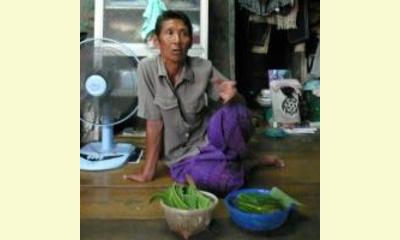|
|
Hope in a Shanty Town: Story of a Woman in Bangkok
un articulo por Supara Janchitfah, excerpted with permission from www.takeastep.net
Prathin Wekhawakyanon’s shanty house is small, even not enough space for two people to sit comfortably without bumping into things in her house, but her heart is always big enough to accommodate all the troubles that the members of the Four Regions Slum Network (FRSN) encounter. Prathin 56 year-old is the chairwoman of the FRSN which is a member of the Assembly of the Poor, an umbrella of many grass-root organizations in Thailand. The FRSN, itself has 10 member networks, consisting of 110 communities with around 7,000 families.

click on photo to enlarge
A decade ago, Prathin was once only obsession with how to make ends meet and ignore the other people’s plight. But she has turned her life upside down when she learned the structural problems that oppressed her and many marginalised in Thai society. She learned by participating in actions to ask for the housing rights since 1998.
Prathin said often time, the past governments proposed two major solutions which failed to understand the way of life of the people who live in the slum. “They want us to move from the city or dislocate us to live in flats. They are not our choices. These alternatives do not correspond to our working conditions,’’ she said.
Shifting them to areas outside the city will only deprived them from workplaces which they will end up having to spend more time and pay more money for transportation. “For living in flats, it seems to be good and tidy but it is not suited to our way of life, many of us need space and areas to do our job such as preparing food for sale and some need space to store their collecting recycle items,’’ she said.
Opposing to such proposed solutions, Prathin and her FRSN proposed that they should be allowed to live on the land that they have originally settled and do the community development and improvement. “When petitions did not seem to work out, we would come back and think of new strategies, many times, we end up having to muster our numbers to protest in front of those concerned agencies and certainly the government house,’’ she said, adding that it has been peaceful protests.
Prathin said this is the way, she learned from her NGOs friends that the downtrodden must unite. “If not our voice would be too soft and lost in this polluted noisy society,’’ she smiles, revealing her soft side of a woman who has been struggling her whole life for a decent living.
Presently, 19 FRSN member communities living on land of the State Railway of Thailand have experienced success in renting their land.
Prathin’s efforts to fight for the housing rights for people who live in back alley were recently recognised by the National Human Rights Commission as an outstanding woman rights advocate. But two months after receiving the award, her life remains the same. She still dresses with her worn-out traditional Thai tube skirt and loose shirt. She still earns her living by helping her mother make Thai sweet. “Unless there is a clear change in policy concerning the land reform, I must continue advocating the rights of urban poor and our alliance network in countryside," she says with the determination.
|








|
DISCUSSION
Pregunta(s) relacionada(s) al artículo :
How important is community development for a culture of peace?,
* * * * *
Comentario más reciente:
:
Community plays a important role in developing culture peace. We should promote our cultural values by interacting with each other and making these values part of our daily lives. A good example of this would be raising our children according to beliefs and values which are important for us and our cultural peace. We can also promote cultural peace by making small commuinties within big community and share different ideas and bring new ones in.

|
|








